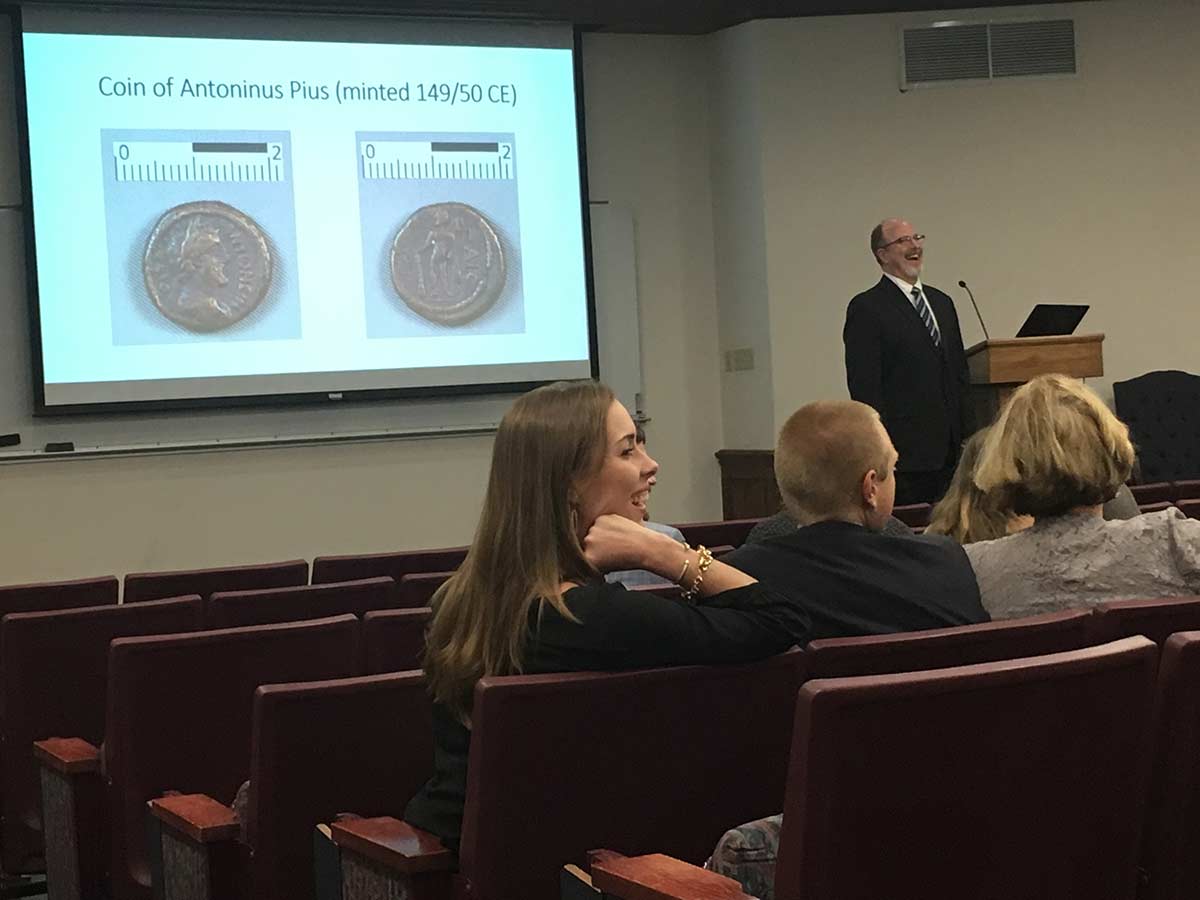
The value of New Testament teachings in a liberal arts education was the topic for the inaugural Granade Lecture Oct. 30 at Samford University.
James Strange, who recently was named as the inaugural Charles Jackson Granade and Elizabeth Donald Granade Chair of New Testament, spoke on “Archaeology, the New Testament, and the Liberal Arts at Samford University,” drawing on his experiences both in the field and on campus to describe the rigorous application of rational methods at a school that maintains strong ties to Alabama Baptists and pursues a Christian mission.
The New Testament finds a natural home not only at a university with that mission, but in the liberal arts curriculum in general. “If we think in the liberal arts way, we say that both the ideas of the Western intellectual tradition, and investigating those ideas, have merit on their own, apart from the application of ideas in practice,” Strange said. “Just as learning to play the violin has merit even if one doesn’t join the orchestra, so learning to read texts closely and deeply has merit whether or not one chooses a career that requires the close, deep reading of texts.”
To demonstrate how such study of texts in the liberal arts tradition trains the intellect, Strange described the early Christian theologian Origen, whose interpretation of scripture focused on spiritual meanings apart from specific cultural contexts in order to perfect Christian understanding.
Origen lived the latter part of his life in Caesarea, not far from where Strange co-leads the excavation of the ancient site of Shikhin. Turning from Origen’s interpretation of Luke 20, in which Jesus takes up a coin bearing the likeness of the Roman emperor and tells listeners to “‘Give to Caesar what belongs to Caesar,’ Strange showed his own audience a hoard of similar, but later, coins found at Shikhin this summer.
The point, Strange said, was not to illustrate the verse in question but to emphasize the difference between Origen’s exclusive concern for the meaning of the coin and Strange’s concern for both the meaning of scripture as well as the understanding of the coin as a human artifact. “Whereas I think about how to apply the text of Luke, in my research and in my teaching at Samford, I tarry over the coin-ness of these coins to learn, or to infer, what I can about the contexts in which we find them,” he said.
Strange said considering scripture in its full cultural context, assisted by the discipline of archaeology, helps him “differentiate between the work of the classroom and what happens in church”.
“The job of Sunday School, sermons, and even practices like the Lord’s Supper is to erase the distinctions of time and place between us and them,” Strange said. “I say, were we to go back in time we would be struck by how people—even the people whom we adore—spoke differently, smelled differently, understood polite personal distance differently, had different understandings of personal cleanliness, and thought differently than we do.”
But as much as Strange relies on the examination of context in what he described as “an exercise in cross-cultural communication,” he acknowledged that Scriptural meanings and applications remain a primary focus at Samford. “For all that I have said about tarrying over the coin-ness of coins in their contexts, and about investigating ideas on their own, it turns out that I also want to put on myself the heavenly man and give to God what is God’s, and I would be very pleased if Samford students did the same,” he said. “But of course, before I say “Amen” to Origen, I ask him, ‘What do you mean?’ and I am back to investigating ideas.”
Reflecting on his twin responsibilities of scholarship and teaching “the mind of God,” Strange concluded that “if you believe that the human intellect is a gift of God, as I do, then the distinction between honing the intellect and asking, what does God want me to do is artificial. Sharpening the intellect is what God wants. God gave the gift, and God expects us, as Origen might say, to ‘perfect’ its use.”
Maryellen Newton is a journalism and mass communication major and a news and feature writer in the Division of Marketing and Communication.
